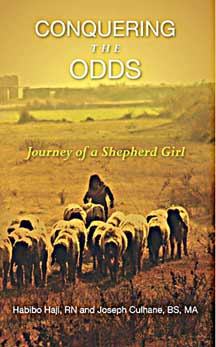Winter 2016 - Resiliency Reader Index
Featured articles include: • Molly's Corner • From Nomad to Nurse, by guest author Habibo Haji • Conquering the Odds (book review by Molly Siebert) • Coaching for Resiliency (article by Glen Fahs) • Upcoming Events • Research Quote of the Quarter • Resiliency Question of the Quarter • Worthwhile Read • Read emailed version of the Newsletter.
From Nomad to a Nurse


Habibo Haji, RN
Guest Author
What is resilience? Think you're a prisoner of a troubled childhood? Think you are emotionally crippled with the memory of war, starvation, beating and rape? Is it possible to bounce back from adversity and go on to live a healthy, happy and fulfilled life? Resilient people do not let adversity define them. They embrace resilience by moving towards a goal beyond themselves, transcending pain and grief by perceiving challenges as ephemeral. Sometimes it is easier to be or play the victim; I had to choose not to be a victim but a survivor.
For most of my twenties, I was angry at my mother, father, grandmother, and anyone who had not protected me from child slavery — where the cows, coats, and sheep were more important than me. I was left alone to take care of the cattle in the desert with no food or shelter for (three) months. The scars of my childhood were raw, painful and bitter. I blamed everyone for my woes. I was depressed, anxious and lonely. I had no self-concept, self-esteem, self-confidence. My children became my main motivation. Tears of sorrow and joy dripped from my eyes when I looked at them. I wanted to flood them with love and provide safety, security, fill the gaps of the lacks I endured when I was growing up.
As I have matured, I have become undauntedly resolute to attain a higher self-development. In that process, a colleague recommended that I read books and listen to tapes; which I started with CDs from Tony Robbins, Les Brown and Jim Rohm. The awakening suddenly occurred and I slowly understood that it is not what happens to me that determine how far I will go in my life; it's in fact how I handle what happens to me. I do have the key to my life and create a legacy for my children. I have the ability and knowledge to overcome any obstacle or situation sent my way.
Developing that resilience helps me not to walk between the raindrops, but have the scars to show from my experience. Resilience is not the ability to escape unharmed, it is not about magic; it's rather feeling the pain and living through it anyway. Imagine at the age of five you were told that you are not pretty enough, smart enough, and you will never amount to anything. And 25 years later, you still feel trapped in that five-year-old's state of mind, how resilient will you be? Survivors cultivate insight — the mental habit of asking themselves questions and finding honest answers. We take charge of problems, stretching and testing ourselves. Reframing is at the heart of resilience. Resilience is a way of shifting focus from the cup-half-empty attitude to the cup-half-full because it is our perception and interpretation that make things good or bad.
Habibo's life started in a remote rural area of Somalia where she endured hunger and malnutrition. When the war broke, she moved to a refugee camp with her siblings, and finally came to the United States. Facing danger every day during her entire childhood, Habibo has overcome incredible odds: surviving malaria more than twelve times, starvations, female genital mutilation and civil war. At the age of sixteen, she ended up in America with no supporting family nor knowledge of English. She worked two jobs and attended night classes while taking care of her children. She graduated with a bachelor's degree in nursing and now works as a registered nurse for the Mayo Clinic in Rochester, Minnesota. Habibo often speaks at various places in hopes of empowering young girls. For more on Habibo's story, please see her book, Conquering the Odds: Journey of a Shepherd Girl. Also, see Molly Siebert's review of Conquering the Odds.
Review: Conquering the Odds: Journey of a Shepherd Girl
 by Habibi Haji, RN
by Habibi Haji, RN
Review provided by Molly Siebert
This book surprised me. Not only is it a book about one person's survival and accomplishments but it is vividly descriptive of the author's thoughts and the life she saw and experienced in each phase of her journey to better herself. I like how Habibo narrates her story. You truly get a sense of the African life and culture, and life in her refugee camps. Also, I am impressed by how she developed problem-solving skills at such an early age. It is heartwarming to read about a such a young girl conquering the odds at each phase of her life with the adaptable skills of resiliency.
The description of the family dynamics and way of local life and survival is delivered quite simply and visually. You sense the African culture mingled with the wariness of hour-by-hour survival in her early childhood. The skills and instincts her mother and grandmother imparted to her, she believes, are key to her survival and her determination to better herself. This is what she tries to pass on to her children.
The details of her three years at the refugee camp in Dadaab, Kenya, as well as the process a refugee goes through once an application to America is approved were fascinating. I found her passage on pages 169-170 about an event at the refugee camp that changed her life, deceptively significant. I believe she had the instinct to realize that education would open doors for her without the realization of how much. She acquired her "education" by learning the "alphabet and math" and "borrowing a friend's homework to learn what they were learning.... Once I learned how to read, I was hooked for life.... It was a turning point for me." Habibo will tell you that faith got her "out of her grandmother's village, and out of Somalia, and out of the Dadaab" refugee camp. For those of you who are familiar with resiliency skills and attributes, what does the following statement tell you about Habibo?
"If you have no plans to do something, but all of a sudden an opportunity pops up and the things that happen are the best in your entire life.... When things like that take place, that many times are out of your control and your life changes completely, that would be a result of faith" (page 170).
When someone recognizes opportunities and events that lead to a better life with acknowledgement and gratitude, they consider it as a gift and as Habibo believed a gift of faith. It's my belief that this experience is a gift of resiliency.
She describes the months involved in the application and approval process for coming to America through the United Nations. You feel her sense of anxiety, wariness and determination to go through endless interviews and medical examinations to gain freedom in America. During the months of this process in Nairobi, she recalls a sense of isolation due to staying in a hotel deep in the corruption of city life and the danger the city holds. Her survival skills she developed as a shepherd in her youth prepared her for this. She was determined to undergo the daily shuttle back and forth in crowded buses to the agency, waiting in long lines for endless interviews and medical exams. She stayed focused on her goal.
I thought it was apt that she uses William Shakespeare quote: "To thine own self be true." This shepherd girl who became a nurse at the Mayo Clinic is a classic example of this quote. The pure sense of self and self-worth to achieve what she has achieved have their genesis in the role models of her mother and grandmother. Additionally, a unique pattern of her personality and self-worth was her celebration of survival at the end of the day. Habibo will tell that her story of overcoming the odds was "sheer determination to survive, to improve, and to make a better life for myself and those around me.... Plain and simple."
I truly enjoyed this book. -- MS
View Conquering the Odds: Journey of a Shepherd Girl at Amazon.com
Coaching for Resiliency

by Glen Fahs, PhD
Resiliency is a very personal decision: Will we react as a victim or as a strategist? Will we give up or battle back and see the value in setbacks?
That decision — made in little ways daily, in big ways when crisis looms — can be empowering. Asking "Why is it good that this happened?" reframes negative turns into opportunities. Opportunities for creative shifts, for learning, for digging deeper into our individual and shared potential.
But relying on our individual strengths is limiting. We are stronger when our relationships are stronger, when we get help. If we break a leg, a health care professional can set it better than we can. If we exercise, a trainer will help us make better use of our efforts and motivate us to reach higher levels. So it is a sign of confidence and strength to rely on a coach for discipline and perspective.
Some perspective comes from reading books and articles such as those written by Viktor Frankl and Al Siebert. Similarly, media such as movies give us role models who struggle against the odds, usually coming out on top. Some comes from throwing ourselves into challenging situations and finding ways to survive and thrive. Some comes from reflecting on experience. Coaches help us target those challenges, prepare for them and learn from them.
Coaching Skills: The number one skill of a coach is active listening. The coach probes for what may drive the person (let's call that person the "partner") and what may hold the person back. Great listening involves:
- showing interest verbally and nonverbally,
- asking open-ended questions that help the person explore feelings and possibilities,
- succinctly reflecting back the person's words, especially their desires and assumptions.
When did a coach help you most? I have had the great fortune to have several caring mentors who believed in me and gave me opportunities to shine. They helped me without getting in the way, without distracting me with too much direction. But they got me to think and act on my insights.
Effective coaches and mentors build trust with honesty, openness and reliability but mostly for wanting the best for their partner. They listen, encourage, share humor, praise, and follow up. Their emotional intelligence helps the person feel special.
Coaching for resiliency emphasizes helping others see their strengths and passion and focus them on vision and goals. While it is natural to avoid one's fears, the coach can help the person assess what is truly the risk involved and whether that risk is worth taking. We gradually overcome our fears when we normalize them.
Do you choose not to be bitter? To help your self and others to become better and better? Then maybe you are already a coach for resiliency.
If you would like a resiliency coach, speaker or trainer, call Glen at 971-570-0159. To become certified for resiliency work, please see the guidelines on the Al Siebert Resiliency Center website: ResiliencyCenter.com.
Glen Fahs, PhD, has been a coach and leader for decades in the fields of training, resiliency, continuing education, change and transition. He has high-level training experience in government, nonprofit and the private sector and has taught for 12 colleges and universities. He has served on several boards, including currently on the Al Siebert Resiliency Center board.
